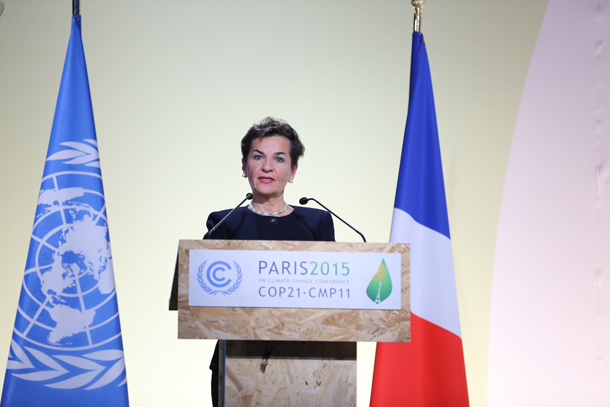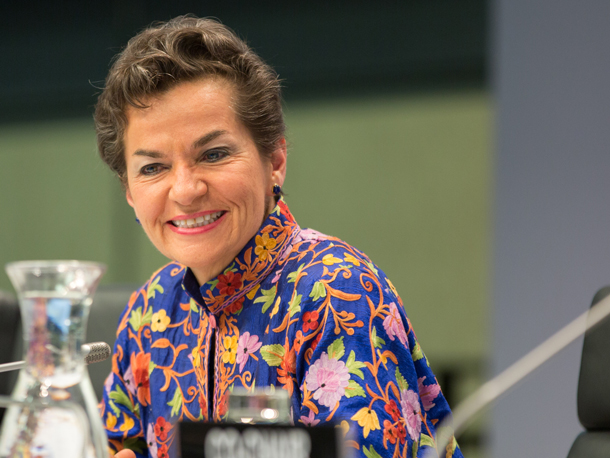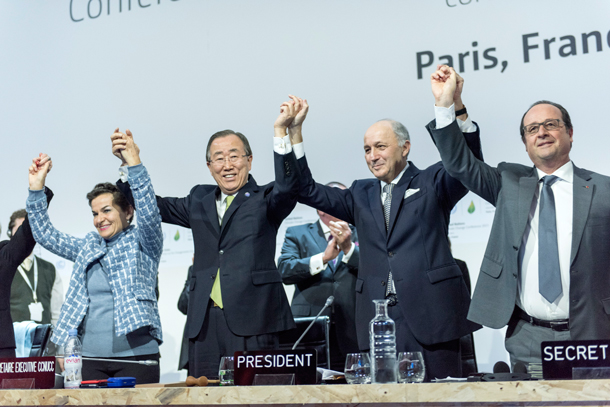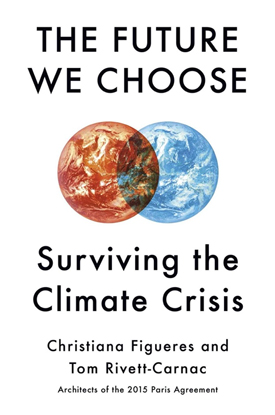The Future We Choose: Surviving the Climate Crisis
Air Date: Week of May 15, 2020

After the mostly unsuccessful COP15 climate change conference in Copenhagen in 2009, the UN Secretary General appointed Christiana Figueres as new Executive Secretary of the United Nations Framework Convention on Climate Change, starting her first term in July 2010. (Photo: UN Climate Change, Flickr, CC By 2.0)
The success of the Paris Climate Agreement took the thoughtful cooperation of all nations of the world and coordination by the UN team led by Christiana Figueres. In her new book "The Future We Choose: Surviving the Climate Crisis", Figueres shares her personal experience of leading the 2015 Paris talks and outlines key strategies for moving our society towards ecological responsibility. Figueres joined Host Steve Curwood at a recent “Good Reads on Earth” virtual event to discuss the urgent need to kick fossil fuels, the current pandemic crisis, and more.
Transcript
CURWOOD: It’s Living on Earth, I’m Steve Curwood.
The Coronavirus pandemic has made it clear that the world is increasingly interconnected. But amid the tragedy of the virus a top climate diplomat says there is an opportunity to rebuild our economies in ways that are both more equitable and sustainable. Christiana Figueres was the Executive Secretary of the United Nations Framework Convention on Climate Change when the world came together to hash out the historic Paris Climate Agreement. And the Costa Rican diplomat recently wrote a book titled The Future we Choose: Surviving the Climate Crisis. She joined us for a virtual Good Reads on Earth event to talk about her book. I started by asking her about the relationship she sees between climate disruption and the coronavirus pandemic.
FIGUERES: Oh, wow. Well, actually quite a few, quite a few lessons that we can learn from the pandemic Steve. I think we have learned very quickly and very deeply that global challenges are global that they don't ask for a passport, they don't stop at any border, due to immigration, nothing like that, right? But definitely something that should teach us the lesson that building walls is completely ridiculous in front of global challenges. The other piece that I have learned is that exceptionalism is such a myth. We are only as vulnerable as the most vulnerable person among us, among us being on the planet. As long as there's one person that has the virus, we're all exposed in one way or the other. To think that you're an exception to a global rule is ridiculous. And the same thing goes for climate as long as there are some populations and we all know which of the populations that are most vulnerable, always the bottom of the pyramid. But as long as they are affected, we're all affected. So it's in our self interest actually, to act out of solidarity.
CURWOOD: This is a big deal. But what's happened this is, in fact, I think will realign how we conduct our civilization going forward. I hope so. And reminds us of what was said back at times in the ecological environmental movement to think globally, and act locally. Exactly. Because you can point out, you know, the poorest paid among us in the United States, now where I'm speaking to you from don't have access to good healthcare can't get tested for the virus. And yet, these are the folks who are cooking the food that people might take out or packaging the groceries that might get delivered or with
FIGUERES: or delivering the packages. Yeah.
CURWOOD: Delivering the packages or, you know, working in healthcare settings where wages are again, very low, and in care facilities were that we have such a ridiculously high death rate.
FIGUERES: And hence exposing to each other, right. So exposing themselves.
CURWOOD: Exactly.
FIGUERES: So you know, the appreciation for all of those professions that we never really thought about before, it has also just skyrocketed, which is a good thing. But the final thing that I just wanted to add about lessons learned is there are many different kinds of risks. But there are some that are less or more probable, and there are others that have higher or lower impact. But the real ones that we have to take a look at are the ones that have both high probability and high impact. That is true of this virus. The same thing is true with climate Steve, right?
CURWOOD: Right.
FIGUERES: That is a high probability, high impact threat. And the quicker that we understand that and begin to respond, the less we're going to suffer. So you know, although coming from two very different sources, huge common lessons between climate and the virus.

Christiana Figueres grew up in Costa Rica. She is the daughter of Jose Figueres Ferrer, who served three times as President of Costa Rica. (Photo: UN Climate Change, Flickr, CC BY 2.0)
CURWOOD: And by the way, in your book, you point out that as the permafrost melts, viruses might be released because, of course, viruses when they're frozen, they can sit around forever.
FIGUERES: Yeah, I mean, that's the other thing that the relationship between climate and health is a direct relationship because first, many of the vector borne diseases that are borne by mosquitoes, for example, such as malaria and dengue and chikungunya, all of those diseases currently are restricted to the equatorial belt because that is the temperature and water conditions humidity conditions, that those mosquitoes that bear the disease need. But as temperatures increase, those temperature and precipitation conditions will actually expand beyond the equatorial belt into much higher up in the north and in the south. Hence, we will have malaria, dengue and chikungunya in areas that have never known that disease. So that's one direct impact. And the other one is you point out is that the permafrost, such as in Siberia, that has been frozen for thousands of years, could very well hold viruses that haven't been affecting us but as it melts, we could be exposed to very unusual viruses and hence, you know, diseases that we have never even heard about. So yeah, I mean, the relationship between health and climate is a pretty close one.
CURWOOD: Indeed. I mean, just here in the United States, we see very high mortality associated with people living where the’re a lot of particulates from pollution. Now, let's talk about your book some more. You have three mindsets that you describe in it. So I'm going to ask you if you could walk us through them and why you consider they're so essential when when tackling this climate crisis. Let's start with stubborn optimism. Is that you? Are you that stubborn optimist?
FIGUERES: Yeah, yeah, yeah, yeah. We do learn things in life. And I've actually learned that it's important to be stubborn, especially if it's for the common good, right? And and so that's where that stubbornness comes. And the optimism the combination of being stubborn and being optimistic for me, means that it's not a naive optimism. It's not, you know, a blind optimism. It's actually a very educated and informed optimism that knows exactly what the conditions are either on climate or on this virus in this case. So it's an informed optimism. But it is a choice that we make to have a constructive, determined attitude that in the face of any challenge, including the one that we have, that we collectively can get out of this, because if we start with an attitude of defeatism well, then we probably stand very little chance of succeeding. Right? You know, as as the saying goes, whether you think you're going to succeed or you think you're not going to succeed. You're probably right either way, because your thought very much determines the probability of success. And so you know, arming ourselves with the gritty determination to get through any challenge is important. And we have to be stubborn about it because we know that any challenge comes with barriers and with problems that we have to get through, we have to be gritty about it.

Pictured above: the closing ceremony of the twenty first Climate Change Conference in Paris (COP21). Christiana Figueres stands along UN Secretary-General Ban Ki-moon, Laurent Fabius Minister of Foreign Affairs of France and President of the COP21 Conference, and Francois Hollande President of France at the time. (Photo: Mark Garten, Flickr, CC BY 2.0)
CURWOOD: So stubborn optimism, and then you talk about endless abundance as another mindset that's critical here. I thought we got in trouble because we think that we have endless abundance and we can just use all the resources that's on the planet. What do you mean?
FIGUERES: Yeah, well, that one does a really cool mindset because it's a provocative one, right? And it really calls into question what do we mean by abundance and what do we mean by scarcity. The reason why we have gotten to scarcity is because we have been extracting using and wasting or just throwing aside whatever we have extracted and used once. And so that has led to a scarcity of everything a scarcity of clean water, certainly a scarcity of, of atmosphere space. But you know, it is quite impressive that given the technologies that we have now that we can actually create abundance. And here's what I mean by that there is a way of thinking that would have us, I'm going to take my piece and use it and then discard it. Or even worse, Steve, the paradigm that we have grown up with, which is the zero sum paradigm, right? I'm going to win and in order for me to win, I'm going to make you lose. That zero sum game is totally and competition, this unhelpful competition is totally against a mindset of abundance. And when we let go of that, then we understand that actually we can create an abundance that is good for all of us, and that we can all win. So for example, what We can do by cleaning the atmosphere by drawing from renewable energy sources that are completely abundant, right there is no end to how much sun rays we will be able to collect, there's no end to how much wind we will be able to collect. That is abundance. And we can bring all of this energy and all of this electricity to any part of the world. So we have to be able to think in a different form. It's not me against you, it's me and you creating together.
CURWOOD: So how do you get an abundance in thinking? Because right now, it seems to me we have a paucity of clear thinking about how you know the planet works. It's getting us into this whole climate crisis. We seem to be very short, on a critical mass of folks to respond to this crisis where we are right now. In your book, you point out, you know, hey, this is like, you know, few minutes before midnight. We’re right there. We don't make the moves in this time in this window, we have cast the die, at least for hundreds of years.
FIGUERES: Yes.
CURWOOD: For the people, and maybe the civilization that follows us.
FIGUERES: Yep. And you know, when we wrote the book just a few months ago, we were thinking that we actually had these 10 years this decade in order to make the difference with greenhouse gases. And what is really scary, Steve, is that this Corona virus is sort of like climate change in a time warp, right? All of a sudden, everything has speeded up. And just to bring these two things together, the recovery packages, obviously, governments have to deal first with health issues and security and jobs. But once they get to the recovery period beyond the immediate health crisis, they are already designing recovery packages. And those recovery packages will be trillions of dollars. Some of my friends say even up to $10 trillion. Well, here's the thing, if those $10 trillion around the world go into the fossil fuel industries and all of its derivatives, we then have cemented ourselves into a high carbon high emitting economy for decades to come. And we will totally close the door to the possibility that we have right now of reducing our emissions according to science, which is reducing the emissions to one half of what we have right now by 2030. Conversely, if those recovery packages are designed with all of the crisis in mind with the health crisis, with the climate crisis, with the oil crisis, and with the inequality crisis in mind, right? If we put our arms around all of these crises that are affecting each other, and increasing each other, if we put our arms around all of them as opposed to treating them separately in silos, and we say right, these have all collided now let's converge the solutions and let's be smart about how we are going to design and dedicate this fresh capital that is going to go into the economy. Then we have the most extraordinary opportunity to really make a difference on all of those issues. But if we don't, if we actually take one by one sequentially, we are in very, very bad shape.

The Future we Choose: Surviving the Climate Crisis is a book co-authored by Tom Rivett-Carnac and Christiana Figueres. Tom Rivett-Carnac worked as the Senior Advisor to Christiana Figueres while she was Executive Secretary of the UN Convention on Climate Change. Rivett-Carnac is one of the architects of the 2015 Paris Climate Agreement. (Photo: Courtesy of Christiana Figueres)
CURWOOD: You have a list of things to do some action items, and we would take a fair amount of time, I think if we went through all the action items that you have in The Future Wo Choose. But the first action item, kind of a big one, you say we got to let go of fossil fuels. Stop blaming and pointing fingers but get off of carbon the way an alcoholic has to kick ethanol. How do we do this?
FIGUERES: That's such a good analogy. I never thought about that but yeah, it's a very good analogy because we are addicted by our economy, not we personally, but our economy is so addicted to that. And you know, it's interesting because when you look at the way many investments are made, the logic of investment follows very much the logic of the fossil fuel industry. And it's been a really, really tough ride for renewable energy investments to have the access to the capital that they need, because they have a very different economic structure. But we have to get beyond this. I don't believe in blaming the fossil fuels because honestly, look at the United States look at any industrialized country, all the economic growth that is being enjoyed today is thanks to the fossil fuels, so we shouldn't you know, now kick them in the teeth. The fact is that they were incredibly helpful to give us what we needed in the last century, but now, we don't need them anymore. Now we should be grateful to them and put them in the retirement home because that's where they belong. And any attempt to to keep those technologies alive are frankly, they're futile, because we will move beyond them. And, and they are highly irresponsible because they are being responsible for deaths, either through health crisis, or because climate change is actually causing deaths. So we have to be able to move beyond them.
CURWOOD: Well, I want to thank you for taking all this time with us today to talk about the climate, the virus, and your book, which is titled The Future We Choose: Surviving the Climate Crisis. Christiana Figueres, what's next for you? What's your next chapter now that you got this book out?
FIGUERES: Well, I don't know. Steve, because you know, honestly, now that I'm here on the Osa Peninsula with the Corcovado Park it’s pretty, pretty tempting to stay here with the howler monkeys and the scarlet macaws. And you know, it's a pretty wonderful country, what can I say? But right now, right now, I am very focused on really trying to get the best out of the virus crisis, because it is too deep a crisis to not be able to derive a silver lining out of it. And it has fast forwarded the very difficult financial choices that we would have had to make over the next 10 years anyway, but that now have to be made in the short term. So right now, that's what I'm focused on. So thank you very much for giving me an opportunity to share those thoughts. Thank you, thank you for your time. Thank you for talking about our book. And thank you just in general for being a wonderful human being.
Links
Click here to learn more about Christiana Figueres and her organization Global Optimism
Living on Earth wants to hear from you!
Living on Earth
62 Calef Highway, Suite 212
Lee, NH 03861
Telephone: 617-287-4121
E-mail: comments@loe.org
Newsletter [Click here]
Donate to Living on Earth!
Living on Earth is an independent media program and relies entirely on contributions from listeners and institutions supporting public service. Please donate now to preserve an independent environmental voice.
NewsletterLiving on Earth offers a weekly delivery of the show's rundown to your mailbox. Sign up for our newsletter today!
 Sailors For The Sea: Be the change you want to sea.
Sailors For The Sea: Be the change you want to sea.
 The Grantham Foundation for the Protection of the Environment: Committed to protecting and improving the health of the global environment.
The Grantham Foundation for the Protection of the Environment: Committed to protecting and improving the health of the global environment.
 Contribute to Living on Earth and receive, as our gift to you, an archival print of one of Mark Seth Lender's extraordinary wildlife photographs. Follow the link to see Mark's current collection of photographs.
Contribute to Living on Earth and receive, as our gift to you, an archival print of one of Mark Seth Lender's extraordinary wildlife photographs. Follow the link to see Mark's current collection of photographs.
 Buy a signed copy of Mark Seth Lender's book Smeagull the Seagull & support Living on Earth
Buy a signed copy of Mark Seth Lender's book Smeagull the Seagull & support Living on Earth

